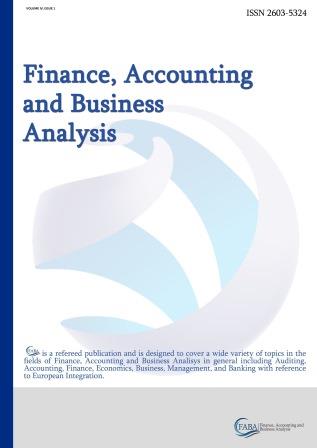Effect of Earnings Quality Properties on The Performance of Companies: Empirical Evidence from South Africa
Effect of Earnings Quality Properties on The Performance of Companies: Empirical Evidence from South Africa
Author(s): Nyanine Chuele Fonou Dombeu, Josue Mbonigaba, Bomi Cyril Nomlala, Magret OdunayoSubject(s): Economy, Business Economy / Management, Micro-Economics
Published by: Институт по публични финанси
Keywords: Earnings; Earnings quality; Performance; JSE listed companies
Summary/Abstract: Objective: This paper examines the effect of earnings quality properties on the performance of Johannesburg Stock Exchange (JSE) listed companies. The earnings quality properties considered include the accrual quality, conservatism, earnings persistence, earnings predictability and earnings smoothness. The five properties are examined individually as well as aggregately. Each property is further separated into its innate and discretionary components and the effect of each component on the company’s performance is examined. Methodology: The quantitative method and purposive sampling is used in this study. The sample consists of 800 observations obtained from 80 non-financial companies listed in the JSE during the period of 2009-2018. The performance is measured using the Return on Asset (ROA) and Tobin Q. The multilevel linear regression is used to test the formulated hypotheses. Results: It was found that, for both measures of performance, each earnings quality property as well the aggregate earnings quality property influence the performance of companies. Some exceptions included the accrual quality, predictability and smoothness which were found not to be significantly related to Tobin Q. Furthermore, it was found that both the innate and discretionary components of earnings quality properties influence the performance of companies. However, the innate component had a greater impact on the performance of companies than the discretionary component. Implication: The study will provide guidelines to investors and other capital market participants on which property of earnings could be used to assess the current performance of JSE listed companies and make prediction about their future performance. This in turn will assist in improving investors’ resource allocation decisions and allow policy makers to develop policies that will lead to more transparent accounting information in order to promote efficiency of the capital market. In addition, the study will inform capital market participants on how managers’ actions (discretionary component) and factors beyond the control of manager (innate component) affect the companies’ performance.
Journal: Finance, Accounting and Business Analysis
- Issue Year: 4/2022
- Issue No: 1
- Page Range: 1-17
- Page Count: 17
- Language: English

